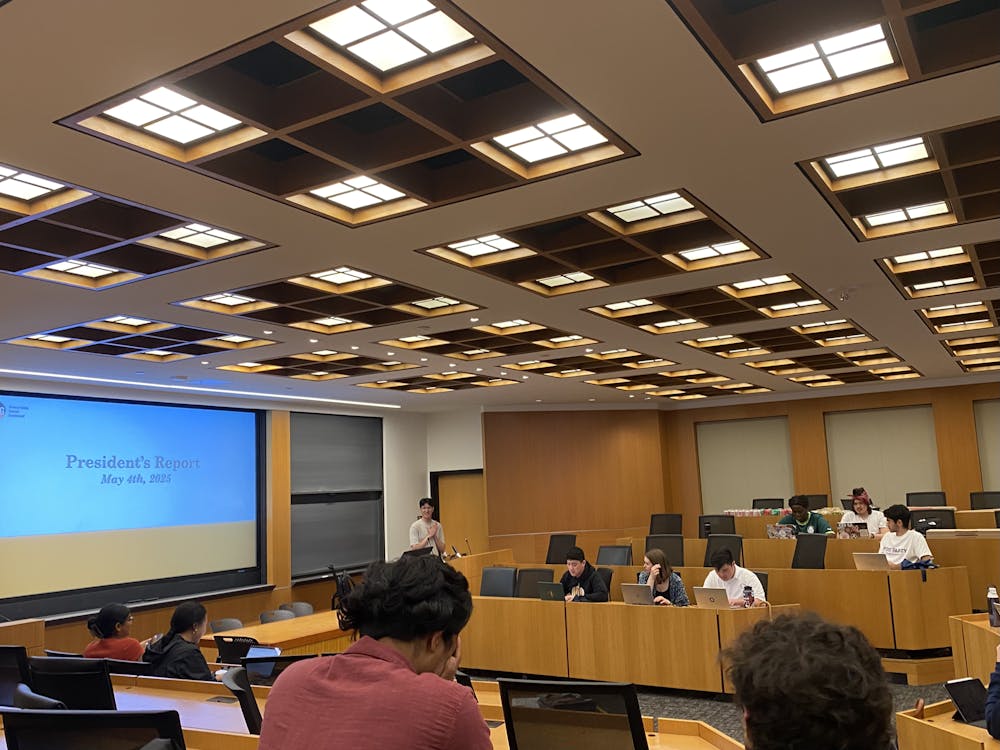The Undergraduate Student Government (USG) has passed a formal resolution that aims to create a series of due process principles they will utilize as they engage in the issue of reforming University disciplinary proceedings.
In the final meeting of the academic year, held on May 4, USG also convened to provide updates on recent community events, chart a timeline for the summer, and reflect on the past semester. The Class of 2026 Senators and the Transit Working Group each gave presentations — the former on upperclass student dining satisfaction and the latter on partnerships with TigerTransit and New Jersey Transit.
President Enzo Kho ’26 started the meeting by sharing that last week’s Lawnparties attracted 4,400 attendees — a “record number,” according to Kho. Porchfest, on the other hand, attracted around 500 student attendees, as did the “Night of Stars” event on Saturday, where students went stargazing under the Frist South Lawn.
“All these things we’re seeing — the efforts to increase attendance and everything, are examples of how USG is able to innovate its approach in terms of expanding our outreach and communication,” Kho said.
Kho also outlined a timeline for the summer: Budget proposal brainstorming for the fall semester will continue throughout mid-June, and USG’s mid-year report will be published by August. By August, preparations for a fall retreat and planned pilot programs for transit and dining will also be finalized.
Reflecting on the semester at large, Kho emphasized USG’s “innovation and creativity” in the way they communicated and engaged with the community, citing coffee chats with students as an example. Kho also highlighted milestones in cultivating institutional knowledge by reaching out to USG alumni and meeting with past USG presidents — a goal he has continuously emphasized.
Class of 2026 Senators Samuel Kligman ’26 and Hriday Unadkat ’26 led a presentation on upperclass student dining satisfaction. According to a survey of over 200 members of the Class of 2026, students, on average, rated their dining situation 4.26 out of 5, with students in an eating club rating their experience more positively than those on independent meal plans or in co-ops.
Kligman and Unadkat emphasized that over half of upperclass students “faced challenges with dining,” and that approximately 70 percent of students dine less frequently on Nassau Street without Paw Points, according to the survey.

The Transit Working Group, led by Vivian Chang ’28 and Raghav Pradhan ’28, also introduced initiatives that include a proposal to provide transportation via TigerTransit on weekend mornings when the Dinky does not run and a proposal to bulk purchase New Jersey Transit tickets to New York City, which is estimated to amount to a $7,875 budget proposal.
Next, Kho, Aishwarya Swamidurai ’26, Uma Fox ’26, and Daniel Shaw ’25 introduced a due process resolution, which creates a framework for USG to approach due process protections and codifies protections. It affirms the need for “a clearly stated presumption of innocence, including a statement that a person’s silence shall not be held against them” and “the meaningful right of the accused to appeal a finding of responsibility.”
“These are often primarily cases around protests and other free expression related issues,” Fox said, in reference to contexts in which due process protections would be used.
This comes after students expressed confusion and frustration about the opacity of disciplinary proceedings during the investigations following the Clio Hall occupation last spring.

Part of the resolution also includes calling on the Council of the Princeton University Community (CPUC) “to reject any proposals relating to changes to the procedure and jurisdiction of the Judicial Committee which do not explicitly guarantee the continued availability of the due process protections found within the procedures of that Committee.”
The March 24 CPUC meeting featured a proposal from the Committee on Rights and Rules overhauling the nearly-dormant Judicial Committee, which was initially established in 1969 to oversee serious disciplinary cases, and making it an appeals body for disciplinary cases. The Committee on Rights and Rules sent that proposal to the Executive Committee, and the USG proposed an amendment to the proposal, which was not adopted.
However, on May 1, Provost Jennifer Rexford withdrew the proposal from the agenda for the upcoming CPUC meeting on Monday, May 5 and remanded it to the Committee on Rights and Rules, hopefully to return to discussion next fall.
“USG’s positions continue to be guided by our fundamental commitments to freedom of expression, as affirmed by our resolution last month,” the presentation read.
The resolution ultimately yielded no votes in opposition and passed. On passing, it will be sent to top administrators including University President Christopher Eisgruber ’83, Rexford, and Vice President for Campus Life Rochelle Calhoun.
Correction: This piece has been updated to better reflect the procedure surrounding the proposal on the Judicial Committee.
Sena Chang is a senior News writer for the ‘Prince.’ She typically covers campus and community activism, the state of higher education, and alumni news.
Please send corrections to corrections[at]dailyprincetonian.com.








